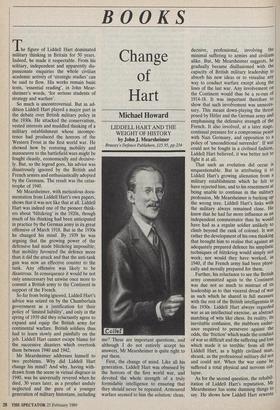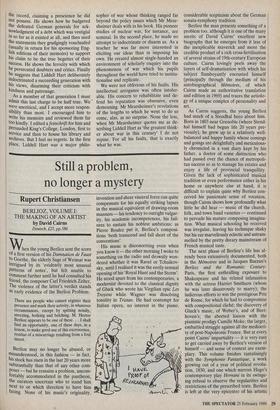BOOKS
Change of Hart
Michael Howard
LIDDELL HART AND THE WEIGHT OF HISTORY by John J. Mearsheimer
Brassey's Defence Publishers, £15.95, pp.234
The figure of Liddell Hart dominated military thinking in Britain for 50 years. Indeed, he made it respectable. From his solitary, independent and apparently dis- passionate enquiries the whole civilian academic activity of 'strategic studies' can be said to flow. His works remain basic texts, 'essential reading', in John Mear- sheimer's words, 'for serious students of strategy and warfare'.
So much is uncontroversial. But in ad- dition Liddell Hart played a major part in the debate over British military policy in the 1930s. He attacked the conservatism, vested interests and muddled thinking of a military establishment whose incompe- tence had produced the horrors of the Western Front in the first world war. He showed how by restoring mobility and manoeuvre to the battlefield wars might be fought cleanly, economically and decisive- ly. But, so the legend goes, his advice was disastrously ignored by the British and French armies and enthusiastically adopted by the Germans. The result was the catas- trophe of 1940.
Mr Mearsheimer, with meticulous docu- mentation from Liddell Hart's own papers, shows that it was not like that at all. Liddell Hart was indeed one of the pioneer think- ers about 'blitzkrieg' in the 1920s, though much of his thinking had been anticipated in practice by the German army in its great offensive of March 1918. But in the 1930s he changed his mind. By 1939 he was arguing that the growing power of the defensive had made blitzkrieg impossible; that mobility favoured the defence more than it did the attack and that the anti-tank gun was now an effective counter to the tank. Any offensive was likely to be disastrous. In consequence it would be not only unnecessary but unwise once more to commit a British army to the Continent in support of the French.
So far from being ignored, Liddell Hart's advice was seized on by the Chamberlain government as a justification for their policy of 'limited liability', and only in the spring of 1939 did they reluctantly agree to expand and equip the British army for continental warfare. British soldiers thus had to learn slowly and painfully on the job. Liddell Hart cannot escape blame for the successive disasters which overtook them between 1940 and 1942.
Mr Mearsheimer addresses himself to two problems. Why did Liddell Hart change his mind? And why, having with- drawn from the scene in virtual disgrace in 1940, was he universally revered when he died, 30 years later, as a prophet unduly neglected and the guru of a younger generation of military historians, including me? These are important questions, and although I do not entirely accept his answers, Mr Mearsheimer is quite right to put them.
First, the change of mind. Like all his generation, Liddell Hart was obsessed by the horrors of the first world war, and devoted the whole strength of a truly formidable intelligence to ensuring that they should never be repeated. Armoured warfare seemed to him the solution: clean, decisive, professional, involving the minimal suffering to armies and civilians alike. But, Mr Mearsheimer suggests, he gradually became disillusioned with the capacity of British military leadership to absorb his new ideas or to visualise any way to conduct warfare except along the lines of the last war. Any involvement on the Continent would thus be a re-run of 1914-18. It was important therefore to show that such involvement was unneces- sary. This meant down-playing the threat posed by Hitler and the German army and emphasising the defensive strength of the French. It also involved, at a later stage, continual pressure for a compromise peace with Nazi Germany, and opposition to a policy of 'unconditional surrender'. If war could not be fought in a civilised fashion, Liddell Hart believed, it was better not to fight it at all.
That such an evolution did occur is unquestionable. But in attributing it to Liddell Hart's growing alienation from a military establishment which he felt to have rejected him, and to his resentment at being unable to continue in the military profession, Mr Mearsheimer is barking up the wrong tree. Liddell Hart's links with the military always remained close. He knew that he had far more influence as an independent commentator than he would have had as a regular soldier unlikely to climb beyond the rank of colonel. It was rather the development of his own thinking that brought him to realise that against an adequately prepared defence his simplistic techniques of blitzkrieg would simply not work; nor would they have worked, in 1940, if the French army had been physi- cally and morally prepared for them. Further, his reluctance to see the British army committed again to the Continent was due not so much to mistrust of its leadership as to that visceral dread of war as such which he shared in full measure with the rest of the British intelligentsia in the 1930s. Liddell Hart always regarded war as an intellectual exercise, an abstract matching of wits like chess. Its reality, its inevitable confusion, the stubborn endur- ance required to persevere against the odds, the 'friction' which made the conduct of war so difficult and the suffering and loss which made it so terrible: from all this Liddell Hart, as a highly civilised man, shrank, as the professional military did not and could not. When the war came he suffered a total physical and nervous col- lapse. As for the second question, the rehabil- itation of Liddell Hart's reputation, Mr Mearsheimer has some damning things to say. He shows how Liddell Hart rewrote the record, claiming a prescience he did not possess. He shows how he badgered the defeated German generals for ack- nowledgment of a debt which was vestigial In so far as it existed at all, and then used the statements they grudgingly vouchsafed (usually in return for his sponsoring Eng- lish editions of their memoirs) to support his claim to be the true begetter of their success. He shows the ferocity with which he persecuted doubters and critics. Finally he suggests that Liddell Hart deliberately indoctrinated a succeeding generation with his views, disarming their criticism with kindness and patronage. As a member of that generation I must admit this last charge to be half true. We were uncritical, and I accept more respon- sibility than most. I encouraged him to Write his memoirs and reviewed them far too kindly. I edited a festschrift for him and persuaded King's College, London, first to service and then to house his library and archives. But I feel no regrets. In the first place, Liddell Hart was a major philo- sopher of war whose thinking ranged far beyond the policy issues which Mr Mear- sheimer deals with in his book. His pioneer studies of nuclear war, for instance, are seminal. In the second place, he made no attempt to indoctrinate or disarm us. As a teacher he was far more interested in eliciting our ideas than in imposing his own. He created almost single-handed an environment of scholarly enquiry into the phenomenon of war which his pupils throughout the world have tried to institu- tionalise and replicate.
We were not oblivious of his faults. His intellectual arrogance was often intoler- able. His concern to rehabilitate and de- fend his reputation was obsessive, even demeaning. Mr Mearsheimer's revelations of the lengths to which he went to do so come, alas, as no surprise. None the less, when Mr Mearsheimer quotes me as de- scribing Liddell Hart as 'the greatest think- er about war in this century' I do not repine. For all his faults, that is exactly what he was.

















































 Previous page
Previous page